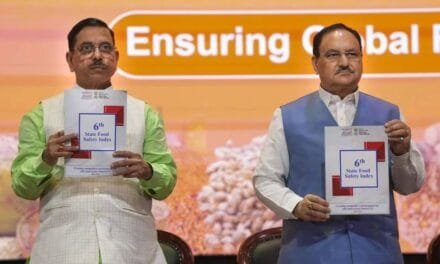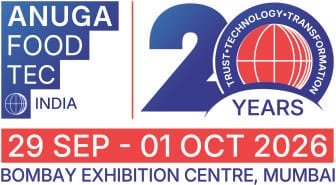‘The Eat Right Movement’ brings together three ongoing initiatives of the Food Safety and Standards Authority of India (FSSAI): the Safe and Nutritious Food Initiative, the Eat Healthy Campaign, and Food Fortification. The highlight of the movement is the rich, credible, and high-quality resources launched to sustain the movement.
In an unprecedented show of solidarity to improve public health in India and combat negative nutritional trends to fight lifestyle diseases, the food industry, public health professionals, civil society and consumer organizations, influencers and celebrities came together on a common platform and pledged to take concrete steps to create ‘The Eat Right Movement’ in the country. ‘The Eat Right Movement’, built on two broad pillars of ‘Eat Healthy’ and ‘Eat Safe’, aims to engage, excite and enable citizens to improve their health and wellbeing.
This movement could not have come at a better time, with Non-Communicable Diseases (NCDs) accounting for 1 in 5 disease-related deaths, widespread anemia and other micronutrient deficiencies on the rise and India becoming the diabetes capital of the world. Led by the Food Safety and Standards Authority of India (FSSAI), the strength of the ‘The Eat Right Movement’ lies in its holistic and collaborative approach, with stakeholders on both the demand and supply-side joining to make a difference through some clearly identified steps. On the demand side, the Eat Right Movement focuses on empowering citizens to make the right food choices. On the supply side, it nudges food businesses to reformulate their products, provide better nutritional information to consumers and make investments in healthy food as responsible food businesses.
The growing consensus amongst industry members on the importance of promoting ‘eating right’ was evidenced by the commitments made by companies across the food chain. While the edible oil industry, bakeries and ‘halwais’ committed to phase out trans-fats by 2022, major food companies pledged to reformulate packaged foods to reduce the level of salt, sugar and saturated fat. The food services sector promised to provide healthier food options and introduce menu-labelling, even as major food retail players including e-commerce players agreed to promote healthier food options and responsible retail practices.
‘The Eat Right Movement’ brings together three ongoing initiatives of FSSAI: the Safe and Nutritious Food Initiative, focused on social and behavioural change around food safety and nutrition at home, school, workplace and on-the-go; the Eat Healthy Campaign, focused on the reduction of high fat, sugar and salt foods in the diet; and Food Fortification, focused on promoting five staple foods-wheat flour, rice, oil, milk and salt that are added with key vitamins and minerals to improve their nutritional content. The highlight of the movement is the rich, credible and high-quality resources launched to sustain the movement.
‘The Eat Right Movement’ Website is an interface between food safety and nutrition experts and citizens. It provides credible and authentic nutrition information including health tips by experts, nutritious recipes, and exciting tools to get a peek into one’s nutritional needs, body indices, learning about nutrition labels, and other resources. Professional associations like the Nutrition Society of India (NSI), Indian Dietetics Association (IDA), Association of Food Scientists and Technologists (India) and Indian Medical Association (IMA), Indian Federation of Culinary Associations (IFCA) and individuals have committed to support this platform.
To kick start and popularize the movement, a powerful infotainment campaign through a short video starring National Award-winning actor Raj Kumar Rao (who consented to participate in the campaign pro-bono) was also launched to encourage citizens to reduce salt, sugar and fat on mass media and social media.
Dissemination of all engagement material, including training modules is through various partners that include Central and State Government Departments, Civil Society Organizations, Industry and Professional Associations, NGOs, national and international agencies, academia and corporates through CSR initiatives.
Speaking on the occasion, Chief Guest, Professor Vijaya Raghavan, Principal Scientific Advisor, added that we need to complement reduction of salt, sugar, fat with lifestyle changes such as eating a more plant-based, natural diet, which celebrity chefs can demonstrate in practice.
Padmashri Chef Sanjeev Kapoor committed to supporting this movement by promoting healthy food on his channel with 80-million viewers. Dr. Balram Bhargav, DG, ICMR pointed out that non-communicable diseases were rampant in India and this movement along with ‘Thoda Kam’ gesture was a brilliant idea to drive home the message and urged mobilizing street food vendors for this movement as well. Dr. Arabinda Mitra, Scientific Secretary, Department of Science and Technology, mentioned that the formative years of life were critical for inculcating healthy food habits, therefore schools must be targeted with curricular changes to incorporate these messages. Suneeta Narain, DG, Centre for Science and Environment, urged the industry to move ahead on their pledges as fast as possible.
CEO FSSAI Pawan Agarwal remarked that “The Eat Right Movement” could grow organically as a self-perpetuating movement, which was co-owned and co-led by various partners using the broad framework and resources put together by professionals and experts in the field of food and nutrition. FSSAI Chairperson Ashish Bahuguna said these voluntary nutrition commitments were a giant leap forward to combat negative nutrition trends in society.
So far 28 Eat Right Campus certificates have been awarded to educational institutes and corporate campuses, and 30 additional certificates are in the pipeline, according to FSSAI.
Responding to queries, new FSSAI CEO Arun Singhal said: “In the next two years, we plan to scale up the initiative in a big way across the country. FSSAI is engaging various institutions of national importance, government colleges, universities, IITs, IIMs, hospitals, and Central government ministries, to enrol them into the programme.
“Additionally, FSSAI is working with industry associations such as CII (Confederation of Indian Industry), FICCI (Federation of Indian Chambers of Commerce and Industry), ASSOCHAM (Associated Chambers of Commerce and Industry of India) and NASSCOM (National Association of Software and Service Companies)to enrol most of the bigger campuses, to begin with, and reach out to other corporates as we move forward. Finally, States will further engage with local campuses for enrolment. Therefore, we expect this initiative to grow exponentially in the coming years.”
Singhal said the food available in campuses should be safe and healthy, given that diet-related diseases such as obesity, diabetes, high blood pressure and heart diseases are rising at an alarming rate.
So far, educational institutes such as IIT-Roorkee, IIT-Gandhinagar, IIM-Ahmedabad, Lal Bahadur Shastri National Academy of Administration (Mussoorie) and Nirma University (Ahmedabad) have bagged the certificate. Corporate offices and campuses of players such as Marico (Mumbai), Wipro (Bengaluru), Mercedes-Benz India (Pune), ITC (Mysuru), HCL (Noida), Genpact (Gurugram), Hyundai Motor India (Kancheepuram) and Nestle India (Goa) have also got Eat Right Campus certificates.
Once enrolled in the programme, a campus or office premise undergoes a self-assessment or third-party audit by an FSSAI-empanelled agency, to identify gaps and areas of improvement based on a check-list. The campus administration is then given some time to address the gaps which may include training of food safety supervisors and on safe food practices.
Once these improvements are made, the campus undergoes a third-party audit and is given a rating on a five-star scale. If a campus scores three or more stars, it is certified as an Eat Right Campus, and the certification is valid for two years.

















